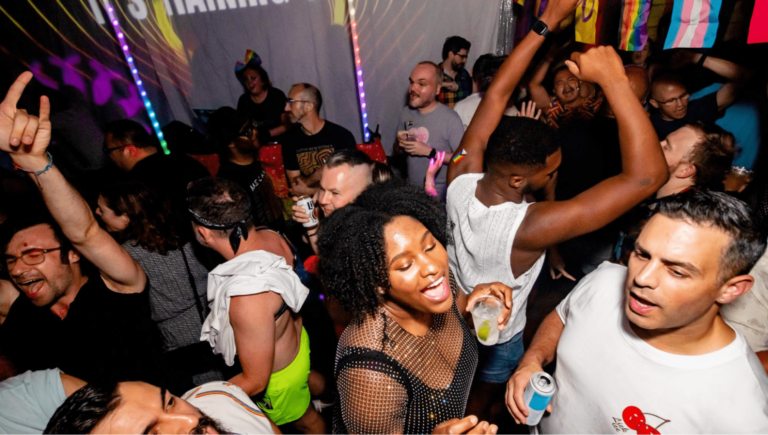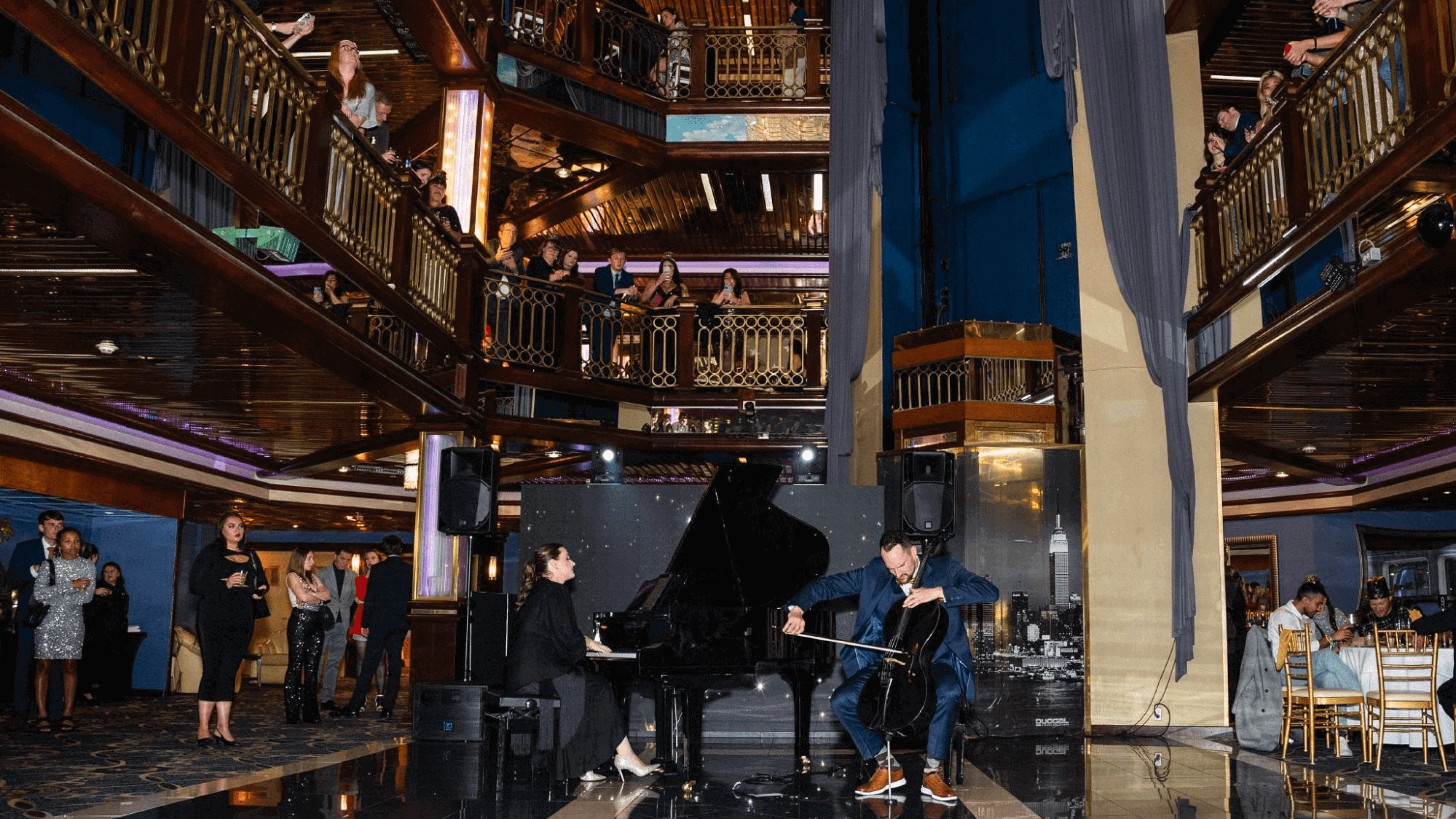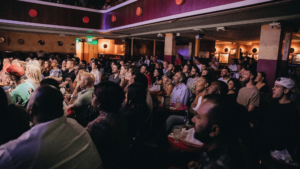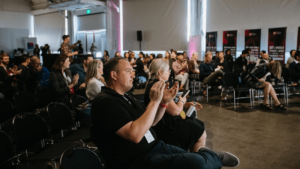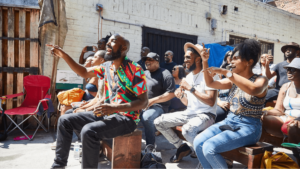Let’s be honest: We’ve all fantasized about becoming an event promoter.
The idea of rubbing shoulders with artists or musicians is certainly attractive. Not to mention the excitement of working in the nightlife industry!
The reality is that event promotion is not all glitz and glamor — and not everyone has what it takes to make it in the industry. Ask any event promoter, and they’ll tell you that it’s a demanding field that’s not for the faint-hearted.
But for those with the dedication and energy to succeed, the events industry offers huge potential. Eventbrite has over a decade of experience in the events industry, and thousands of successful event promoters use our tools. In this article, we’ll break down how to become an event promoter and provide some strategic tips from professionals in the industry.
How to get started as an event promoter: Lessons from the experts
1. Gain experience by working with a mentor
2. Find a niche you can influence
3. Conduct competitor and market research
4. Focus on building in-person and virtual connections
5. Practice with local venues, artists and shows
What is an event promoter?
Event promoters are responsible for spreading the word about events and getting people to attend. They’re tasked with marketing the event, selling tickets, and making events a financial success. Many promoters are contracted by venues or event creators to help draw in more attendees.
For example, a company putting on a music festival might contract with a local promoter to sell tickets and build excitement.
But that’s not the only arrangement. If you’re wondering how to be an event promoter, it might involve starting your own business!
Many event promoters independently run their own small business. Legendary independent promoters like Bill Graham rose to fame by producing concerts with big-ticket artists like The Grateful Dead and Jefferson Airplane. Being a business owner carries a level of financial risk that you need to consider when thinking about this career path.
Unlike event organizers or event planners, promoters don’t generally focus on planning efforts. Instead, they focus on marketing an event and attracting attendees for a sold-out show.
That said, there are many general event management companies that handle all aspects of producing and promoting live events. And some promoters put on their own events from start to finish.
Take DJ Prashant, for example. Prashant describes his job as a “full-time party starter”. His company, Bollywood Dreams Entertainment, promotes fun dance parties all around the west coast.
DJ Prashant has found success in promoting his high-energy events. His company, Bollywood Dreams Entertainment, uses Eventbrite to manage operations, plan events, and sell more tickets. With 400+ events hosted on the Eventbrite platform, DJ Prashant is keeping the party going!
Event promoters take on a lot of responsibilities, but their primary tasks often include:
- Securing venues
- Booking performers
- Building a marketing campaign
- Selling tickets
- Building excitement
- Negotiating and working with partners (venues, artists, vendors, etc.)
If you’re interested in learning how to become an event promoter, this guide will cover everything else you need to know.
Sell more tickets

Do you need a degree to become an event promoter?
You don’t need formal education to become an event promoter. Experience in related industries like music, events, or entertainment is often more important than a college degree.
With that said, certain degrees can help event promoters in their careers. A lot of event promotion skills overlap with business skills. So, degrees in marketing, business, and communications can be beneficial.
In the nightlife and music industry, personal and professional connections are more significant than your education. Who you know can change the course of your career by opening up new opportunities. Connections made in college could benefit you later. But many promoters will gain the most ground with direct involvement in the event industry.

How do event promoters make money?
Event promoters can earn money in a number of different ways.
In most circumstances, event promoters are paid by hour or on a salary. Promoters employed by a venue or an entertainment group will earn a flat hourly or monthly salary.
In other cases, promoters may contract with a specific event or venue. In this case, promoters may be paid by:
- Predetermined pay rate: A flat rate to promote an event for a period of time.
- Price per head: A rate of pay per ticket sold and/or physical event attendee.
- Revenue/profit share: An arrangement where the promoter gets X% of revenue and/or X% of profits from the event. For instance, a promoter may earn 5% of total revenue at an event (including ticket sales, food and drink, merch, etc.), or they may earn 20% of net profits.
However, independent event promoters create their own events, hire the talent, pay for the venue, and sell tickets. They’ll earn a profit if revenues are higher than expenses.
Then, there are arrangements where promoters partner with event venues. For instance, a promoter may get to keep revenue from ticket sales, while the venue keeps all food and alcohol sales.
There’s a lot of variability in event promoter salaries and earning methods. Some promoters may have multiple income streams.

Are there different types of event promoters?
A key step in figuring out how to become an event promoter is to identify which type of events you’d like to promote.
Here are the main event promotion types, along with salary expectations for each.
Note: Salary data is sparse, as many event promoters are independent business owners and don’t earn a traditional “salary”. Take event promoter salary data with a grain of salt.
General event promoters
Average salary: $57,000/year
Generalist promoters may work on a variety of projects, ranging from performing arts events to conferences. They may promote their own events, client events, or a mix of both. These promoters often focus on a specific geographic area rather than on a certain event type.
Nightclub promoters
Average salary: $48,000/year
Nightclub promoters attract revelers to nightlife venues through planned events and are typically contracted with nightclub owners. A common model is a pay-per-head contract or a percentage of drink and ticket sales. Some larger clubs may also have an in-house promoter on the payroll.
Festival promoters
Average salary: $46,000/year
Festival promoters work on big events — think multi-day concerts or large food and drink festivals. Festival promoters are often tasked with building excitement for both the festival itself, as well as individual performers or festival components. For instance, a music festival promoter could target some of their marketing efforts towards fans of specific bands that are headlining.
Concert promoters
Average salary: $50,000/year
Concert promoters arrange shows and sell tickets. They typically pay artists directly and sell tickets — meaning there is some risk of losing money if revenue targets aren’t reached.
While national promoters are largely dominated by big firms (like LiveNation), there’s still a huge market for local promoters. National promoters often pay local promoters to help arrange and promote regional shows.
Venue promoters
Average salary: $82,000/year
Venue promoters are attached to a specific venue or venues. They may own or manage the venue or simply partner with the owner. Independent promoters often partner with venues on a profit share basis or revenue split basis. For instance, a common model for bars and restaurants is that event promoters keep ticket sales while the venue keeps food and drink revenue.

How to become an event promoter: Lessons from the experts
Events professionals come from all different backgrounds and life experiences. Usually, there’s no way to become a “certified” event promoter or obtain a degree.
Many hard-working event promoters have found success using Eventbrite, the leading event marketing and ticket sales platform. We put together this round-up of expert advice from some of these successful promoters.
1. Gain experience by working with a mentor
Mentors can introduce you to connections and provide real-world perspectives at any stage of your career, but they’re most crucial early on.
Corey Schneider, CEO of New York Adventure Club, explains that “nobody can be an expert in everything”. So he seeks out specialist mentors when he’s looking to try something new. Schneider recommends using SCORE, a free service that can connect you with volunteer business mentors.
To connect with a mentor, consider these strategies:
- Start working in events to meet other professionals in the industry
- Approach successful event promoters/organizers in your area to ask for advice.
- Join online networking groups
- Attend in-person or virtual conferences and industry events
2. Find a niche you can influence
Finding a specialty area of events can help your services become more niche and refine your perfect event type. This doesn’t mean you’re limiting your customer base, though. “Niche” doesn’t need to mean “small”!
Successful nightclub and event promoter Jamie White figured out that students in his area were underserved by the local nightclubs. After researching the success of nightclub events in his area, he determined that mainstream/pop music nights were actually performing best for his target audience of students.
To find your specialty, consider these tips:
- Tie in findings from your competitor research (see below) to identify opportunities.
- Consider your ideal attendee first before refining the type of events you’re going to run.
- Think about your connections to find opportunities for collaborations.
3. Conduct competitor and market research
Research your local market and your direct competitors to help you identify opportunities. Maybe there’s a thriving underground music scene in your city but fewer big-name shows. Or maybe your competitors are mostly running paid ads on social media but slacking on traditional advertising methods like putting up posters.
To conduct this kind of analysis, use these strategies:
- Search for events in your area on Eventbrite, taking note of any that are closely related to your event type.
- Find other event creators and promoters who operate locally. Take note of their ticket pricing strategy and promotion methods. Follow them on social media to see how they build excitement for their events.
- Gather demographic information for your local area from the US Census Bureau. Stats like average income and marital status can help you identify the type of events that are most likely to succeed.

4. Focus on building in-person and virtual connections
Your connections can make or break your event promotion career. For example, Jamie White approached the owner of an empty nightclub with a tempting offer: to get 500 people through the door on the slowest day of the week in exchange for 75% of the door take and special drink discounts to promote. This strategy kicked off Jamie’s successful strategy, which ultimately led to him selling out tickets to multiple events each week.
To build connections, try out the following:
- Join the Eventbrite Creator Collective to connect with other event entrepreneurs
- Approach venue owners who you’re interested in working with to see how you can benefit them (and vice versa)
- Network with people in the industry matching your event type — like artists or comedians
5. Practice with local venues, artists, and shows
You know your local community. Chances are, you have a good idea of what might work for the demographics in your area. By starting close to home, you’ll have a logistical and tactical advantage.
To get started locally, consider:
- Approach event organizers in your area to see if you can start working together
- Think about the venues that have found success in your town, and take note of their strategies.
- Draw on your local connections — and get out in the community to make new ones!
You may also want to incorporate your local area into your branding and web content if you’re trying to attract clients. For instance, you could advertise as a Denver event promoter or a festival promoter for NW Washington markets.

Skills you need to succeed as an event promoter
Success as an event or party promoter hinges on hard skills, strategic thinking, and networking. Developing these attributes early in your career will give you a huge leg up.
Marketing skills
Getting the word out about events will require you to understand online and traditional marketing. Get started by taking free online courses, like the Fundamentals of Digital Marketing from Google.
Business skills
Many promoters operate small businesses and must learn how to generate profit. Organization, financial expertise, and bookkeeping skills are all important here. A good place to start is the Small Business Association’s Business Guide.
People skills
The event promoter job description includes a lot of interaction with people! From event attendees to clients to business connections, you’ll be doing a lot of networking. Udemy offers a number of free communications courses to help sharpen your skills.
Industry-specific skills
You’ll also benefit from learning specific skills that are related to your industry.
Wondering how to become a music promoter? Keep an ear out for new talent to identify up-and-coming artists to promote.
Want to excel in B2B event promotion? Practice professional networking and brush up on topics your clients and attendees are interested in.
These skills are largely acquired through practice — so get out there and start experimenting!
How to become an event promoter? Hard work and passion
Event promotion is about more than free drinks and ticket sales.
To be a successful event promoter, you have to ‘love the grind’ of events and everything that comes with it.
Now that you’ve learned how to become an event promoter, it’s essential to equip yourself with the right tools.
Start by utilizing Eventbrite’s marketing and discovery platform. Eventbrite can help to get your events noticed by event-goers actively looking for unique things to do in their local area.
